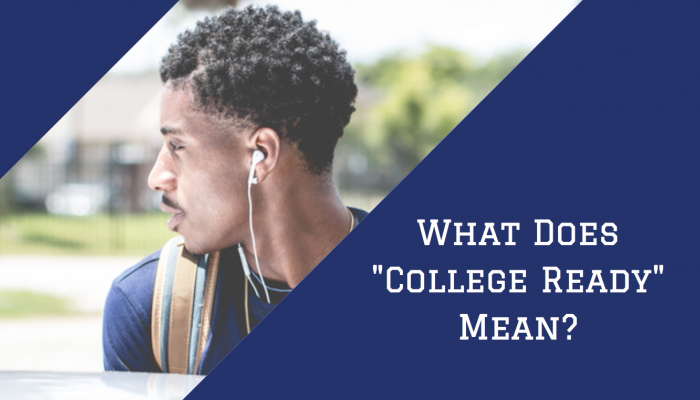Why Schools Need to Change
What Does “College Ready” Mean?
Topics

Today’s learners face an uncertain present and a rapidly changing future that demand far different skills and knowledge than were needed in the 20th century. We also know so much more about enabling deep, powerful learning than we ever did before. Our collective future depends on how well young people prepare for the challenges and opportunities of 21st-century life.
From a perspective of true college readiness, what does it look like for a student to be well-prepared for success in higher education?
When you think about a high school student being college ready, what do you think about? Perhaps a list of their completed courses, GPA, ACT/SAT scores, and participation in athletics or clubs come to mind as important aspects of college readiness?
Let’s dig a little deeper. From a perspective of true college readiness, what does it look like for a student to be well-prepared for success in higher education? Students should ask themselves if they are prepared socially to be an independent adult learner, what types of study strategies they use, and are they ready for the financial responsibilities attached to higher education?
The answers to these questions are complex, and are dependent upon a wide range of variables; rather than provide concrete answers, I’m going to outline five tangible and realistic areas that high school students should explore before entering higher education:
- Study Skills: Learn various study strategies and try them out. Many top high school students are not deeply challenged in their academic coursework, and this can lead to weak study skills and unrealistic expectations regarding the amount of effort they’ll need to expend to continue achieving at a high level as they progress through higher education. Many extremely smart and talented students struggle through their first few college courses because they never developed a structure for studying that involved committing a large number of hours each week outside of class for reading, reviewing, and mentally engaging with their academics. Successful students need to create routines and habits for how they spend time each week outside of the classroom concentrating on their studies. (Check out these resources on study strategies from the Study Cycle at Louisiana State University (LSU).
- Dual Enrollment: High school students should consider taking advantage of a variety of dual enrollment opportunities. While Advanced Placement (AP) courses are an outstanding way for students to achieve college credits, AP courses should not be the only type of dual enrollment course a student undertakes. To truly prepare for college, top high students should enroll in courses offered directly by an institution of higher education. For example, The Ohio State University Academy offers all Ohio high school students opportunities to take dual enrollment courses from any Ohio State campus via in-person and online options. Top high school students who are ready for an academic challenge should take advantage of this kind of exposure to college coursework as a way to adapt to a new academic environment while still within their established social and emotional home environments.
- Information Literacy: It can be overwhelming to try to analyze and process the incredible amount of information that comes at each of us every day from a wide variety of media streams and social inputs. We need information literacy skills to be able to wade through the incessant flow of positive, negative, factual, fictitious, deceiving, and collectively mind-numbing messages, articles, tweets, likes, photos, and videos we constantly receive. In a recent article, Alan November argues for the importance of students understanding why they need to seek out verification of information sources, and how they can use Google and other tools to determine if what they are reading is legitimate.
- Financial Literacy: I was not prepared to be financially independent when I went away to college. I didn’t understand student loan or financial aid structures and opportunities. Both of my parents went to college, but I had very little knowledge about creating or managing a budget, how credit cards work, and absolutely no understanding of rental contracts and the madness of the college textbook industry. College is expensive. Students need to fully understand the financial impact of their commitment to higher education and the opportunities for support and guidance available to them. There are resources available, such as OSU’s Student Personal Finance Quick Course, that can help first year college students in finding their financial footing.)
- Computer Science: The greater understanding a young student has about computers and technology, the better. Yet many young Americans are literally left to their own devices when it comes to learning how to use technology. Having better developed technical skills will lead to a more successful educational experience, as well as more career opportunities and pathways. There are currently 500,000+ computing jobs available in the United States, yet we don’t have enough qualified workers within computer science and information technology to support our ever-expanding digital infrastructure. Every business and career path utilizes computing technology; the more you know, the more valuable your skills are to prospective employers.
Want to learn more about college readiness? Find out how The Ohio State University partnered with 10 high schools throughout the state of Ohio to begin exploring this important topic.
To learn more about student success in learning, work, and life, check out the NGLC MyWays Student Success Framework.




